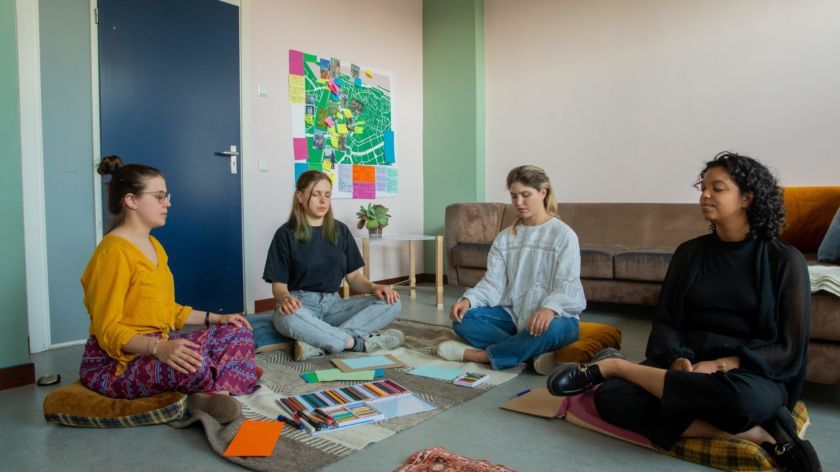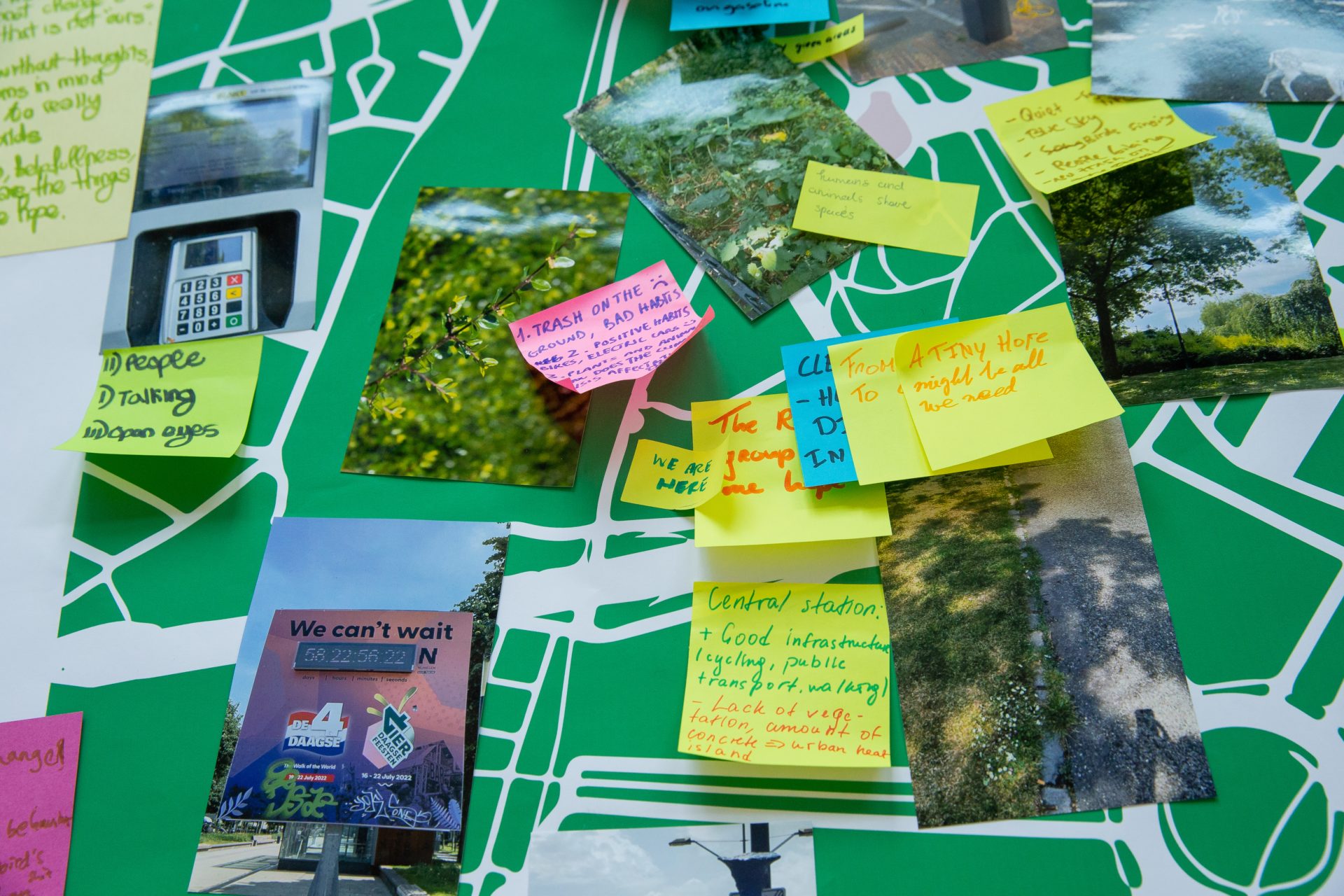Rethinking education in times of global warming unites students from university and ArtEZ
-
 Meditation during the opening of a RE:PLACE honourslab meeting. Photo: David van Haren.
Meditation during the opening of a RE:PLACE honourslab meeting. Photo: David van Haren.
Creating education that responds to the climate crisis. That’s the goal of RE:PLACE, an honours lab in which students from the Radboud University and from art school ArtEZ develop new learning environments focusing on sustainability.
‘We forgot to take the pasta off the stove,’ says Hannah Fricke (26). Fricke and her fellow students are about to have dinner together. They always do this during the weekly RE:PLACE meetings, a transdisciplinary honours lab from the Radboud University and the art school ArtEZ. The walls of the room they use for their meetings is covered in art they made themselves.
An ignorant observer wouldn’t know that having dinner together is an integral part to the education within this honours lab. Just like the meditation session at the beginning of the meeting which was supervised by ArtEZ-student and yoga teacher Karolina Wargin (31).
‘There is not enough room for creativity in regular education’
‘We’re creating and testing learning environments and educational practices that focus on strengthening the vigor of students within the climate crisis,’ says Rozalia Tóth (28), researcher at the Teaching and Learning Centre and host of the honours lab. ‘And RE:PLACE focuses on educational innovation that revolves around the assumption that we live in the Anthropocene, during a time of climate crisis.’
During the lab meetings, there’s no such thing as teachers and students, only participants. Together, they write a scientific article on the learning environments and educational practices they’ve tested.
Creative
The climate crisis was an important reason for Wargin to take part in the honours lab. She was born in Poland but moved to Italy when she was eleven. One-and-a-half years ago, she came to the Netherlands for the master Artist Educator at ArtEz. ‘That’s how I ended up at RE:PLACE. I wanted to be more actively and politically involved with climate changes by working together with other people.’
Fricke has been living in Nijmegen since 2017 but she was born in Germany. The collaboration was a challenge for master student biomedical sciences. ‘Groups are usually not my thing but it’s going well at RE:PLACE. I think it’s very valuable to have a place where you can exchange ideas and can engage in your creativity.’
‘Having your own place is important in order to feel like you belong somewhere’
Grace Renfurm (25) is studying the master Philosophy, Politics and Society, and applied for the honours lab because regular education doesn’t work for her. ‘There is not enough room for creativity and your own contribution.’
Gap
That is the exact reason why Tóth started the honours lab in 2020. ‘We live in a period with climate crisis, war in Europe and the division between Global North and Global South (the richest countries are in the north and the poorest countries are in the south). This raises a lot of questions about, for example, how you as a person can live the best life in a world like that. These questions aren’t answered in current scientific education. We try to search for answers.’
Some participants needed to get used to that. ‘Because of our different backgrounds, it was difficult to find a common goal. At ArtEZ, we’re used to work on projects but this happens less at the university,’ says Wargin. This gap was closed by many discussions, trying different strategies, and thinking about the structure of the meetings.
‘And we learn a lot from each other as well,’ adds Renfrum. ‘I find that the creativity that the people from ArtEZ bring to this project is very valuable.’
The meetings take place in the art gallery POPOP, situated at the Stieltjesstraat. The place was chosen especially because it was not attached to the university or the art school. ‘This place gives us the opportunity to create something new, separate from the existing structures and ways of thinking,’ says Tóth. ‘Apart from that, having your own place is important in order to feel like you belong somewhere and to be rooted somewhere.’
Brussels
During the New European Bauhaus Festival that took place from 9 till 12 June in Brussels, the group showed how attuned they are to each other. The festival takes place over four days and it features readings, discussions, performances, and exhibits surrounding the themes of beauty, sustainability, and inclusivity. ‘The invitation to the festival confirmed that what we are doing has an important impact on people,’ says Renfrum.
The organisers asked RE:PLACE to organise an educational program at the festival. Wargin says: ‘We didn’t want to simply be an information booth. That’s why we also organised workshops on storytelling. Since the festival, we really trust in what we’re doing.’
Future of Academia
The transdisciplinary honours lab RE:PLACE is a collaboration between the Radboud University and ArtEZ, and it functions as educational innovation for the research project Future of Academia wherein Tóth participates from the Teaching and Learning Centre. From September onwards, the group organises sustainability meetings for a group of thirty scientists who are involved with sustainability at the Radboud University.




